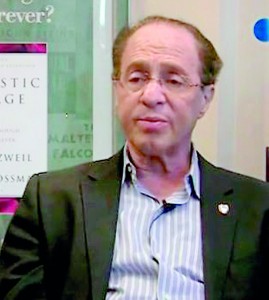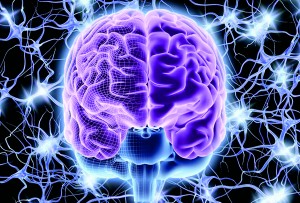Sunday Times 2
We’ll be uploading our minds to computers by 2045
In just over 30 years, humans will be able to upload their entire minds to computers and become digitally immortal – an event called singularity – according to a futurist from Google.
Ray Kurzweil, director of engineering at Google, also claims that the biological parts of our body will be replaced with mechanical parts and this could happen as early as 2100.
Kurweil made the claims during his conference speech at the Global Futures 2045 International Congress in New York at the weekend.

Ray Kurzweil, pictured, said that 'frail, biological parts' of human bodies will be replaced with 'non-biological' parts in the future
The conference was created by Russian multimillionaire Dmitry Itskov and featured visonary talks about how the world will look by 2045.
Kurzweil said: ‘Based on conservative estimates of the amount of computation you need to functionally simulate a human brain, we’ll be able to expand the scope of our intelligence a billion-fold.’
He referred to Moore’s Law that states the power of computing doubles, on average, every two years quoting the developments from genetic sequencing and 3D printing.
In Kurweil’s book, The Singularity Is Near, he plots this development and journey towards singularity in a graph.
This singularity is also referred to as digital immortality because brains and a person’s intelligence will be digitally stored forever, even after they die.
He also added that this will be possible through neural engineering and referenced the recent strides made towards modeling the brain and technologies which can replace biological functions.
Examples of such technology given by LiveScience include the cochlear implant – an implant that is attached to the brain’s cochlear nerve and electronically stimulates it to restore hearing to someone who is deaf.
Other examples include technology that can restore motor skills after the nervous system is damaged.
Earlier this year, doctors from Cornell University used 3D printing to create a prosthetic ear using cells of cartilage.
A solid plastic mould was printed and then filled with high-density collagen gel.The researchers then added cartilage cells into the

Ray Kurzweil - director of engineering at Google - claims that by 2045 humans will be able to upload their entire minds to computers and become digitally immortal - an event called singularity. He made the statement at the Global Futures 2045 International Congress in New York
collagen matrix.
Kurweil was invited to the conference because he has previously written books around the idea of singularity.
Expanding on this idea Martine Rothblatt, CEO of biotech company United Therapeutics introduced the idea of ‘mindclones’.
These are digital versions of humans that can live forever and can create ‘mindfiles’ that are a place to store aspects of our personalities.
She said it would run on a kind of software for consciousness and told The Huffington Post: ‘The first company that develops mindware will have [as much success as] a thousand Googles.’
Rothblatt added that the presence of mindware could lead to replacing other parts of the body with ‘non-biological’ parts.
© Daily Mail, London
Follow @timesonlinelk
comments powered by Disqus

